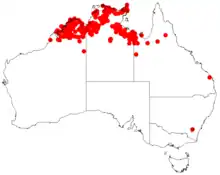| Acacia plectocarpa | |
|---|---|
| Scientific classification | |
| Kingdom: | Plantae |
| Clade: | Tracheophytes |
| Clade: | Angiosperms |
| Clade: | Eudicots |
| Clade: | Rosids |
| Order: | Fabales |
| Family: | Fabaceae |
| Subfamily: | Caesalpinioideae |
| Clade: | Mimosoid clade |
| Genus: | Acacia |
| Species: | A. plectocarpa |
| Binomial name | |
| Acacia plectocarpa | |
 | |
| Occurrence data from AVH | |
Acacia plectocarpa is a tree or shrub belonging to the genus Acacia and the subgenus Juliflorae that is endemism to north western Australia.
Description
The often spindly tree or shrub typically grows to a height of 2 to 10 metres (7 to 33 ft)[1] but can reach up to 13 m (43 ft) It usually has a single stem with flakey or fissured bark that is grey to black in colour. The glabrous angular branchlets are yellowish to brown in colour and usually resinous. Like most species of Acacia it has phyllodes rather than leaves. The thinly coriaceous, glabrous and evergreen phyllodes have a linear to narrowly elliptic shape and are flat and stright to slightly curved. The phyllodes have a length og 9 to 26 cm (3.5 to 10.2 in) and a width of 1.5 to 14 mm (0.059 to 0.551 in) and ahv appressed hairs on nerves and margins with a midnerve and two more prominent secondary nerves.[2] It blooms from March to June producing yellow flowers.[1]
Distribution
It is native to a large area in the Northern Territory and the Kimberley region of Western Australia where it is found to grow in a variety of habitats.[1]
See also
References
- 1 2 3 "Acacia plectocarpa". FloraBase. Western Australian Government Department of Biodiversity, Conservation and Attractions.
- ↑ "Acacia plectocarpa". World Wide Wattle. Western Australian Herbarium. Retrieved 10 December 2019.